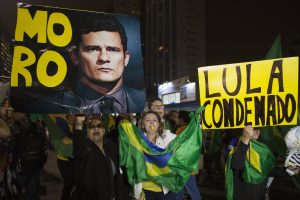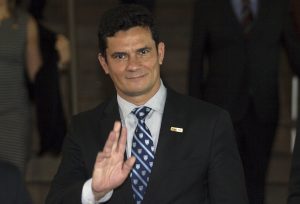Sao Paulo, Jul 12 (EFE).- Protesters both in favor of and against the prison sentence handed to Brazil’s former president Luiz Inacio Lula da Silva took to the streets of Sao Paulo on Wednesday, as military police were deployed to avoid possible confrontations.
A protest in downtown Paulista Avenue calling for the resignation of Brazilian President Michel Temer – under fire over corruption scandals – ended up being overtaken by Lula supporters.

After Lula, 71, was handed a nine-and-a-half year prison sentence on Wednesday by federal judge Sergio Moro on corruption and money laundering charges, two more demonstrations started on Paulista Avenue, the financial heart of the country.
Lula’s sympathizers, convened by trade union centers and social movements, gathered outside the Sao Paulo Museum of Art to show their support for the former president and former labor union leader.
Less than a block away in front of the Federation of Industries of the State of Sao Paulo, the country’s most influential employers’ organization, anti-Lula protesters gathered to celebrate his conviction, calling for his immediate arrest as they waved Brazilian flags and posters praising Judge Moro.
The Sao Paulo military police, who did not report on the number of protesters, positioned blockades to prevent clashes between the opposing demonstrations as they continued over four hours.
Lula, who governed Brazil from 2003 to 2011, was found guilty in connection with the massive corruption scandal centered on state oil company Petrobras.
The charges rested on the claim that Lula was given a beachfront duplex apartment near Sao Paulo by OAS, one of the engineering companies implicated in bribing Petrobras executives to secure inflated contracts and diverting some of the extra money to politicians who provided cover for the graft.
The former president denies that he ever owned the apartment, or benefited from property renovations that the prosecution claimed was at his request.

Lula becomes Brazil’s 1st ex-president with criminal conviction
 Sao Paulo, Jul 12 (efe-epa).- Luiz Inacio Lula da Silva, Brazil’s most popular politician of the modern era, became on Wednesday the country’s first former president to be convicted in a court of law.
Sao Paulo, Jul 12 (efe-epa).- Luiz Inacio Lula da Silva, Brazil’s most popular politician of the modern era, became on Wednesday the country’s first former president to be convicted in a court of law.
Lula, 71, was sentenced to nine years and six months in prison in connection with the massive corruption scandal centered on state oil company Petrobras.
Both the guilty verdict and the sentence – which are subject to appeal – were handed down by Judge Sergio Moro, who is overseeing the sprawling Petrobras investigation.
In the name of prudence and a wish to avert “traumas,” the judge declined to order the erstwhile head of state held pending the outcome of appeals.
“The defense is here to express the deepest indignation over the approval of a verdict that cavalierly rejects evidence of innocence,” a member of Lula’s legal team, Cristiano Zanin Martins, told a press conference in Sao Paulo.
Martins described his client as “quite serene, but as with any person who is convicted without evidence, a natural outrage exists.”
The defense attorney stressed that only five of the paragraphs of Moro’s decision dealt with the evidence presented of Lula’s evidence.

Moro found the former president guilty of having accepted services valued at 3.7 million reais ($1.1 million) from a construction company that benefited from contracts with Petrobras.
The charges rested on the claim that Lula was the real owner of a a beachfront triplex near Sao Paulo registered in the name of OAS, one of the engineering companies implicated in bribing Petrobras executives to secure inflated contracts and diverting some of the extra money to politicians who provided cover for the graft.
Lula, who governed Brazil from 2003-2011, allegedly accepted renovations to the luxury apartment as a reward for giving OAS the inside track on government contracts.
The former head of state denies that he ever owned the apartment, much less benefited from improvements to the property.
Lula faces four other corruption trials that could derail his bid to recapture the presidency in 2018, though he will remain eligible to run until and unless a conviction is upheld on appeal.
The higher courts are unlikely to render a final decision on Wednesday’s conviction before mid-2018 at the earliest.
Lula’s Workers Party (PT), which the then-union leader helped found in 1980, blasted Moro’s decision as “disgraceful” and without foundation.
Dilma Rousseff, ousted from the presidency last year by Congress on dubious grounds, said that her predecessor and patron was innocent and predicted that the Brazilian people would “rescue him in 2018.”
Brazilian lawmakers are currently weighing whether to allow a criminal case to proceed against incumbent President Michel Temer, who is accused of accepting bribes from meatpacking giant JBS and of encouraging that company to pay hush money to a former top lawmaker convicted earlier this year in connection with the Petrobras scheme.
Those allegations stem from plea-bargain testimony by JBS executives, including an audio recording in which Temer appears to tell company chairman Joesley Batista that payments to the former speaker of Brazil’s lower house of Congress, Eduardo Cunha, needed to continue to prevent him from turning state’s evidence.
Temer has vehemently denied any wrongdoing.
JBS executives also have told prosecutors as part of plea-bargain testimony that the company provided tens of millions of dollars in campaign contributions to Temer’s two immediate predecessors, Rousseff and Lula, in exchange for favors.
